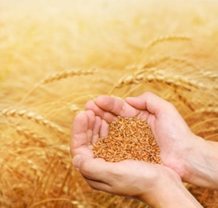Topic of the Month
Wheat genome sequencing gets major boost
Wheat is the staple food for more than 35% of the global human population and accounts for 20% of all calories consumed throughout the world. As global population grows, so too does its dependence on wheat. To meet future demands of a projected world population of 9.6 billion by 2050, wheat productivity needs to increase by 1.6% each year. Since availability of new land is limited to preserve biodiversity and water and nutrient resources are becoming scarcer, the majority of this increase has to be achieved via crop and trait improvement on land currently cultivated. A high quality reference genome sequence will provide the detailed genomic information necessary to underpin wheat research ensuring achievement of this goal.

The International Wheat Genome Sequencing Consortium (IWGSC) has announced the production of a whole genome assembly of bread wheat, the most widely grown cereal in the world, significantly accelerating global research into crop improvement. The project consisted of producing a whole genome assembly of the bread wheat variety Chinese Spring based on Illumina short sequence reads assembled with NRGene's DeNovoMAGICTM software.
The public-private collaborative project is coordinated by the researchers of IWGSC, IPK Gatersleben in Germany, University of Saskatchewan's Crop Development Centre in Canada, Global Institute for Food Security in Canada, Kansas State University in the United States. Project participants also included researchers from Illumina, Inc.; NRGene in Israel and the United States; Tel Aviv University in Israel; and the French National Institute for Agricultural Research (INRA).
A leading author of the study explained that the new bread wheat de novo for the IWGSC integrated strategy towards delivering a high quality reference sequence for each of the 21 bread wheat chromosomes. The whole genome assembly data integrated with physical-map based sequence data produced a high-quality, ordered sequence for each wheat chromosome that precisely located genes, regulatory elements, and markers along the chromosomes, providing invaluable tools for wheat breeders.
One of the researchers said that this new wheat genome sequence generated by the IWGSC and its partners is an important contribution to understanding the genetic blueprint of one of the world's most important crops. It will provide wheat researchers with an exciting new resource to identify the most influential genes important to wheat adaptation, stress response, pest resistance, and improved yield.
Source: www.sciencedaily.com/releases/2016/01/160106091505.htm